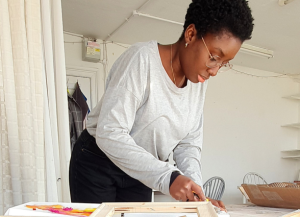 What was it like having Sickle Cell Disease (SCD) growing up?
What was it like having Sickle Cell Disease (SCD) growing up?
While rare, as a child with Sickle Cell Disease (SCD), I didn’t experience painful crises. It was only later as a teenager that I started having crises. However, I did struggle with eating proper, nutritious meals which resulted in having to see a dietitian for many years. I grew more slowly than the average child and was often the smallest person in my class. I also had frequent and sometimes severe infections which could take a long time to treat and recover from.
The concept of having to take regular medication for the rest of my life seemed like the biggest inconvenience and a marker of how I felt different to my peers.
How does SCD affect your everyday life?
 I can feel tired more often and more easily than the average person which can be quite frustrating. It’s something I have become accustomed to and can manage fairly well.
I can feel tired more often and more easily than the average person which can be quite frustrating. It’s something I have become accustomed to and can manage fairly well.
I have been told that SCD has also been the cause of some degenerative effects to my health which, during diagnosis, was hard. It can also feel overwhelming when things you don’t consider being linked to SCD turn out to be a symptom of the condition. I generally try to live my day-to-day life as normally as possible but not at a detriment to my health. At its worst, the effects of sickle cell can mean that I have to reschedule or cancel plans at the last minute, particularly when a crisis happens suddenly. At their most severe, crises have resulted in having to go to A&E, an experience which can be quite challenging in itself.
How do you maintain a work-life balance?
This is one of the more challenging aspects of living with SCD. This year especially, when my health was at its worst and I was hospitalised, I learnt how crucial it is for me to listen to my body. I found myself experiencing fatigue like never before which meant many missed studio days, and days spent at home letting my body rest and heal. It was incredibly frustrating in the beginning, especially with the creative vision and ambitions I had for my practice this year. I actively remind myself to be sensitive to my body and health while making adjustments to my day-to-day plans. My long-term goals will happen, it just may take a change in pace.
How does SCD impact your art?
 Prioritising my recovery means my creative work inevitably moves at a slower pace, but this has also changed my perspective. I see that living with SCD aligns with my value of respecting and embracing the natural flow of creativity even when it feels like there are delays. There may be chunks of time where I can’t work as quickly or as efficiently as I would like to, but I’m determined to see my visions come to life.
Prioritising my recovery means my creative work inevitably moves at a slower pace, but this has also changed my perspective. I see that living with SCD aligns with my value of respecting and embracing the natural flow of creativity even when it feels like there are delays. There may be chunks of time where I can’t work as quickly or as efficiently as I would like to, but I’m determined to see my visions come to life.
Have your career aspirations changed?
I‘ve always wanted to create and work for myself in some capacity, however I have realised the importance of working to my own framework and creating a creative career that can thrive in spite of living with SCD. In fact, it’s taught me to be flexible and find ways to adapt whilst still having a focused long-term vision and end goal. I’m always learning and I don’t allow any of my limitations to hinder that.
